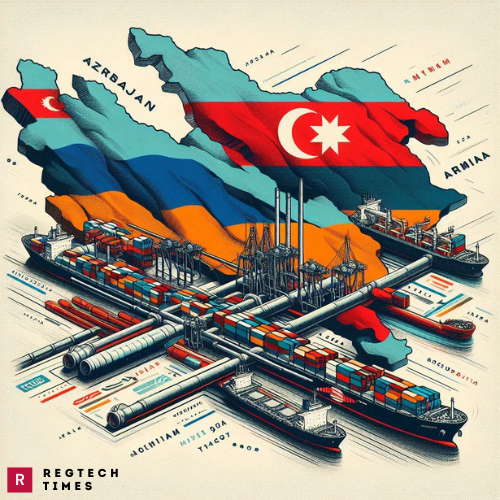In a notable escalation of regional tensions, a coalition of ten pro-government non-governmental organizations (NGOs) in Azerbaijan has accused Armenia of assisting Russia in evading Western sanctions imposed following Russia’s full-scale invasion of Ukraine. This statement, released on September 17, highlights the complexities of geopolitical dynamics in the South Caucasus, where both Azerbaijan and Armenia maintain significant economic ties with Russia, albeit under different circumstances.
The open letter, directed at officials in the United States and the European Union responsible for sanction implementation, highlights a perceived disparity in trade relations. The Azerbaijani NGOs claim that Armenia’s trade with Russia has surged significantly since the onset of the war in Ukraine, raising concerns that this relationship could facilitate Russia’s circumvention of sanctions. According to Russian Deputy Minister Alexei Overchuk, trade between Armenia and Russia increased by an astonishing 55.8% in 2023, reaching approximately $7.4 billion. This figure has only accelerated, with bilateral trade amounting to around $8.4 billion in the first half of the year alone, prompting speculation that total trade could hit between $14 billion and $16 billion by year’s end.
Contrasting Economic Ties for Azerbaijan
In stark contrast, while Azerbaijan has also experienced increased trade with Russia, the level of dependency is notably lower. The country’s trade volume with Russia has surpassed $4 billion, with significant investments flowing in from Russian businesses. During a recent visit to Azerbaijan, President Vladimir Putin highlighted over $4 billion of direct Russian investment in the Azerbaijani economy, indicating a robust economic relationship that may contradict the narrative of Armenian complicity in aiding Russian sanctions evasion.
Sabit Baghirov, the chair of the Entrepreneurship and Market Economy Development Assistance Fund, one of the organizations behind the letter, pointed out that Russia constitutes 37% of Armenia’s foreign trade, compared to just 8.5% for Azerbaijan. He emphasized that this significant dependence renders Armenia’s trade practices particularly susceptible to scrutiny. The NGOs argue that Armenia’s growing economic ties with Russia pose a challenge to international sanctions and efforts to isolate Russia economically.
Russian Startup IRT Blatantly Defies Western Sanctions with UAV Sales
Complex Trade Dynamics
However, independent economist Rovshan Aghayev cautions against a one-dimensional view of the situation. He notes that trade turnover with Russia has dramatically increased in both Armenia and Azerbaijan since 2021. In fact, he highlighted that Azerbaijan’s trade with Russia grew from just $55 million in 2021 to around $1 billion in 2023, which includes not only exports but also imports of Russian oil and gas. This reality complicates the narrative that solely positions Armenia as the primary actor in aiding Russia’s sanctions evasion.
Azerbaijan’s growing energy exports are particularly noteworthy in the context of Europe’s search for alternatives to Russian gas following the Ukraine conflict. Many analysts speculate that Azerbaijan could be acting as a conduit for Russian energy supplies to Europe, raising ethical and geopolitical questions about the nature of its economic interactions.
The Role of Civil Society
The backdrop of these developments includes a worrying trend in Azerbaijan regarding the status of civil society and independent media. The NGOs that signed the letter are perceived as closely aligned with the Azerbaijani government, raising questions about their independence and objectivity. Following a crackdown on independent media and civil society since late 2023, many NGOs find their activities severely restricted, often relying on government funding to operate. Baghirov himself acknowledged the challenges faced by Azerbaijan NGOs in criticizing government actions, stating that the overwhelming majority of these organizations receive grants exclusively from the government, limiting their ability to act as independent watchdogs.
This situation is compounded by the ongoing conflict between Armenia and Azerbaijan over the disputed region of Nagorno-Karabakh, which remains a flashpoint in the region. With Russia traditionally positioned as an ally of Armenia, the shifting dynamics in trade and alliances are indicative of broader geopolitical currents that continue to shape the South Caucasus.
The recent accusations from Azerbaijani NGOs against Armenia illuminate the intricate web of economic ties and political maneuvering in the region. While the claim of Armenia aiding Russia in evading sanctions may resonate within certain narratives, the reality of trade relationships is more complex. As Azerbaijan navigates its growing ties with Russia amidst a changing geopolitical landscape, the voices of civil society, although muted, remain critical in understanding the full scope of these developments. The road ahead for both nations will undoubtedly be shaped by their economic interactions, regional alliances, and the ever-evolving context of international relations.


